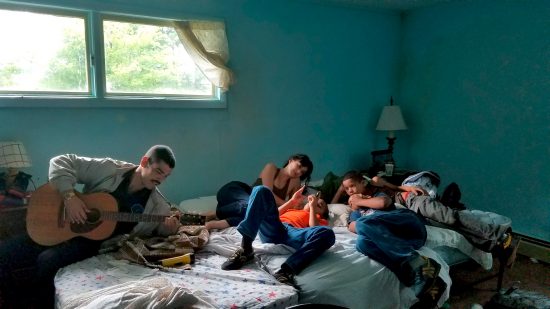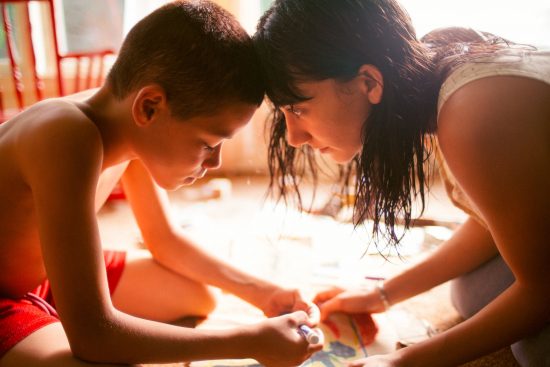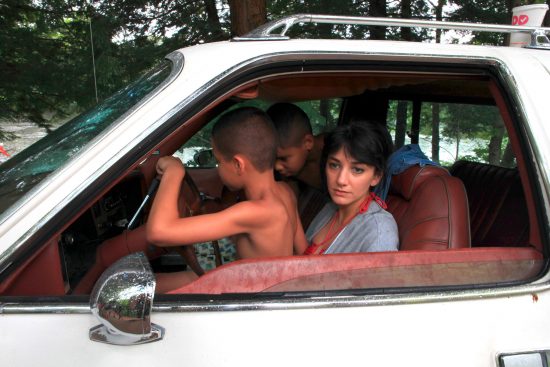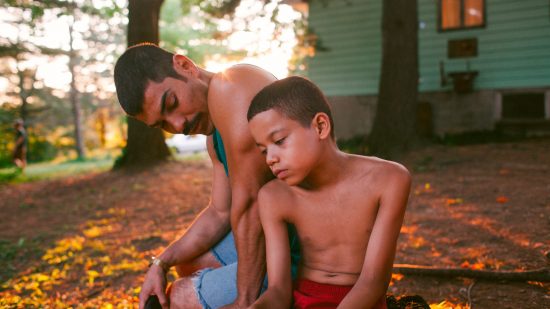Review: We The Animals – “Cinematic art at its purest”
There couldn’t have been a better time to release We The Animals than Pride month. The world needs more queer stories that feel relatable and authentic and this little indie gem that won the NEXT Innovator Award at last year’s Sundance Film Festival isn’t just another dramatic coming of age journey of self-discovery. Filmmaker Jeremiah Zagar has crafted a vivid portrait of a family that is full of love but can’t seem to find a healthy way to channel it and get themselves stuck in a pattern of self-destruction.
Based on the outstanding debut novel by Justin Torres, which Zagar co-adapted for the screen with Dan Kitrosser, this is cinematic art at its purest, blending in cinema verité with the dreamlike quality of Terrence Malick and the hard-hitting emotional punch of a queer-themed masterpiece like Moonlight. And it’s no surprise the film is the first narrative feature of a successful documentary filmmaker. Zagar, in fact, proves to have the perfect sensibility to tackle such a brutally realistic tale that’s heavily dipped in social commentary without ever losing the lyricism that leaps off the novel’s pages.
Set somewhere in Upstate New York, We The Animals explores a summer in the life of three young brothers on the cusp of pre-teen age: Manny (Isaiah Kristian), Joel (Josiah Gabriel) and the youngest, Jonah (Evan Rosado), through whose eyes we experience the events both on screen and on the page. Their Puerto Rican father and Italian-Irish mother’s unrequited young love has led to teen pregnancy but churning out two more kids hasn’t made things any easier and playing house prematurely has taken its toll on the couple over the years.
Pa (Raúl Castillo) and Ma (Sheila Vand) work graveyards shifts – as a security guard and a factory worker respectively – and the children are left to their own devices for most of the day. Poverty and mixed-race background are self-explanatory when it comes to their social isolation, yet their bond is strong enough to overcome anything that’s thrown at them, especially their parents’ toxic relationship. Pa and Ma are in fact one of those couples whose obsessive love and electric sexual chemistry often explode into rage and violence as the frustrations of their financial hurdles and Pa’s predictable macho overtones weigh on the harmony of their struggling family.

Raúl Castillo, Sheila Vand, Josiah Gabriel, Isaiah Kristian, Evan Rosado on the set of We the Animals
The three brothers are inseparable, and their make-believe games get them through the hardships of their family life but sometimes it all becomes too much. When Pa leaves the house for an indefinite period of time after beating up Ma pretty badly, the woman has a nervous breakdown and doesn’t even get out of bed, so the kids have to rely on extreme measures like shoplifting when food runs out in the house. However, it’s a vicious cycle and after things simmer down, Pa returns home almost as if nothing ever happened, and the couple acts madly in love until their next friction will blow off the lid yet again.
Despite their “Three Musketeers” dynamic, it’s clear from the get-go that Jonah is different from his brothers. Sure, Manny and Joel are in that critical age when they’re starting to emulate their father’s toxic masculinity whilst Jonah is still Ma’s favourite, a daydreamer with a special kind of sensibility. During an endearing and pivotal scene, she asks him to not grow up anymore and that’s symptomatic of the different parental approach the kids are exposed to. For instance, when they’re at the lake having an idyllic family day, Pa tries to teach Jonah how to swim by carrying him in the open water and then abruptly lets him go, which results in the kid almost drowning. But Jonah’s peculiarity transcends the fact he is the youngest of the bunch.
Since the beginning of the film, we realise that the child’s occasional voice-over is more than just a storytelling device mirroring the novel’s first-person narration. Jonah, in fact, keeps a journal where he writes and draws not just the way his life unfolds but most importantly his own special way of seeing the world. Every night, after his brothers fall asleep, Jonah sneaks out and crawls under the bed they all share and pulls out his journal from a tear in the worn-out mattress. He turns a flashlight on and lets his imagination flow free on those pages.
The drawings beautifully come to life courtesy of Mark Samsonovich’s stunning stylised animation, but this is a narrative tool devised by the filmmakers. In the novel, the journal has no drawings and its existence is only revealed in the climactic final section. It’s a fine example of what the fascinating process of screen adaptation is all about and how two different mediums demand different choices in order to achieve their own distinct narrative goals. Obviously, that’s not the only difference between the film and the book, albeit a major one, but any other modification makes perfect cinematic sense.
I’d highly recommend picking up the semi-autobiographical novel after watching the film, not just to discover the promising talent of author Justin Torres but also to appreciate the same story on a new level and unearth a whole other set of layers that work wonders on the page but have been altered to tell the story visually. The talented author has mentioned how “We The Animals contains all the hard facts of his life but the incidents of the book are invention. He wanted to write about a childhood similar to his own and the slow, gradual process of individuation, of coming into your own.”
Zagar has accomplished the arduous task of distilling the essence of Torres’ economic and poetic prose into beautiful images. He has captured naturalistic performances from his cast of unprofessional young actors as well as the seasoned adult thespians. Raúl Castillo of HBO’s Looking fame, is one of the most versatile and nuanced talents working today and he brilliantly portrays Pa’s mix of charm, immaturity and vulnerability. Sheila Vand (A Girl Walks Home Alone At Night) is equally raw and authentic as Ma and her love/hate relationship with Castillo is believable from their first interaction.
But this, more than anything, is Jonah’s story and young Evan Rosado shows great promise by effortlessly embodying both innocence and precociousness, the two intense facets of Jonah’s delicate sensibility and wild imagination. When the brothers befriend an older kid in their poor neighbourhood and the teenager invites them over to show them a VHS of porn, the way Jonah looks at the boy tells everything we need to understand about our protagonist. Rosado masters that subtlety throughout the film, building up towards the intensely emotional finale.
We The Animals is one of those rare films able to give a queer story a universal flavour, where the setting feels real and the events unfold organically, framing life moments that many of us – gay, straight or whatever else – will relate to and identify with. Especially the realisation that no matter how much we love our family, we’re meant to spread our wings and fly away to find out who we really are and stay true to that.
We The Animals is in selected UK cinemas and on Demand now.
Find your closest screening here.













